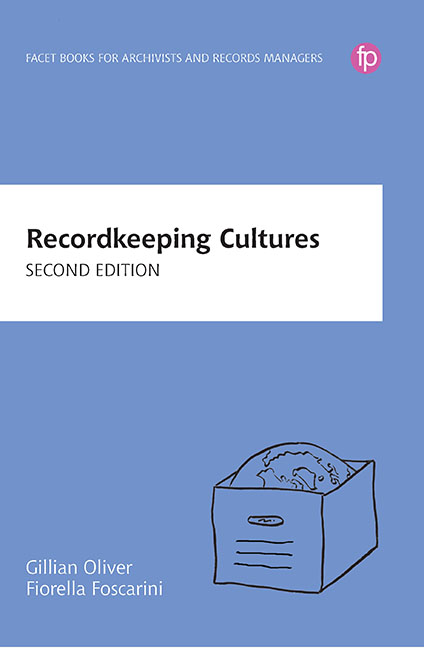1 - Background and Context
Published online by Cambridge University Press: 28 October 2020
Summary
Every organisation, society, or community, has an information culture, or even multiple information cultures. Being able to analyse and understand these cultures is instrumental in developing records management pro - grammes and systems that take people – the employees of the organisation, the members of the society or community – into account. The purpose of this initial chapter is to provide the background detail which describes and explains the foundations of the assessment framework discussed in the subsequent chapters.
This chapter begins by tracking the origins of the concept of information culture, and explaining why recordkeeping cultures deserve special attention, despite the current ‘convergence’ trends that tend to prioritise the notion of information over data and records (Yeo, 2018). Reporting on efforts to date studying information culture from societal, national and organisational perspectives, the latter perspective is emphasised because of its key relevance to records management in the 21st-century workplace. At this organisational level, two incompatible (alternative) points of view can be identified: one that regards an information culture as being conducive to good information management, and the other that takes the view that all organisations have an information culture, no matter how effective the latter may be perceived to be.
This then leads into the specific theoretical orientation influencing our approach to information culture, which is the records continuum. We explain how information culture is an integral part of a new conceptualisation of records management: recordkeeping informatics. This chapter then provides an overall introduction to the Information Culture Framework (ICF), briefly explaining the different levels, of the Framework and the relationships between them.
Finally, the ICF is clearly differentiated by considering it in the context of other evaluation methodologies and tools, such as information audits, information maturity, DIRKS (State Records New South Wales’ Design and Implementation of Recordkeeping Systems), the Impact Calculator, and ARMA (Association of Records Managers and Administrators) International's Generally Accepted Recordkeeping Principles (GARP).
The concepts of information culture and recordkeeping culture
Information culture has been studied from two main perspectives: societal (including national) and organisational. The main focus of this book is on organisational information culture, a concept that we redefine more appropriately as recordkeeping culture; but societal- and national-level consid - erations have to be acknowledged, as these different approaches are not by any means mutually exclusive.
- Type
- Chapter
- Information
- Recordkeeping Cultures , pp. 1 - 32Publisher: FacetPrint publication year: 2019



